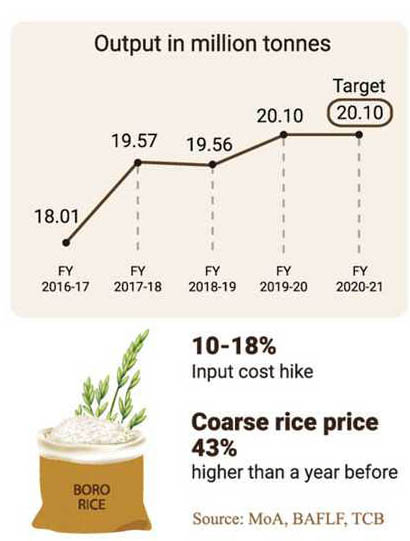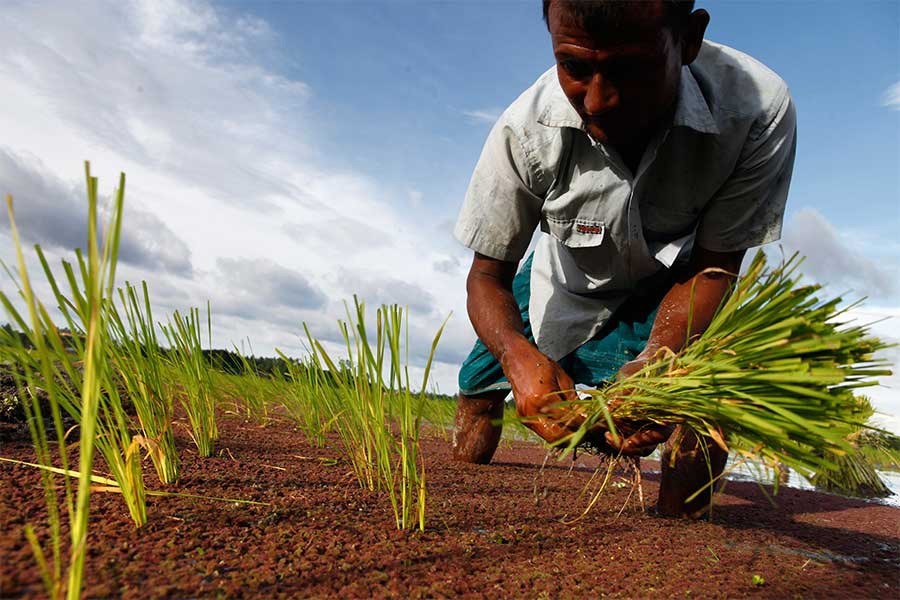Farmers are in dire straits as Boro cultivation costs have inflated due to an escalation in agri-input prices by local businesses this season.
Experts said excessive input costs might make rice pricier again in Boro harvesting season only to batter consumers further.
The local peasantry is thus worried about returns on this huge investment amid the import of the staple as well as an upward trend in farm input prices.

Costs for seed, plough, irrigation, fertiliser, pesticides, labour, haulage and others have risen 10-18 per cent this year, said farm rights bodies.
"Fertiliser sellers in villages are charging much higher for common manure than the government-fixed rates," said Rabiul Islam Manik, a Sujanagar farmer from Pabna.
He bought 100 kg of urea, 20 kg of DAP, 12 kg of TSP and 15 kg of MOP last December for his three-bigha land dedicated to Boro cultivation.
He said urea was charged Tk 19 a kg, DAP Tk 18, TSP Tk 26 and MOP Tk 18 by a village sub-dealer against the government rates of Tk 16, Tk 16, Tk 22 and Tk 15 respectively.
Mr Manik said fertiliser costs have increased by Tk 140-150 per bigha this season.
Bangladesh Agricultural Farm Labour Federation secretary Abdul Majid said latest field reports found 10-18 per cent surge in seed, plough, irrigation, fertiliser, pesticide, labour and transport costs this Boro season.
"We found input businesses, private water pump and tractor operators have raised charge following higher prices of rice in Aman season," he mentioned.
Mr Majid said deep tube-well operators are charging Tk 1,300-2,000 per bigha (33 decimals) depending on regions.
Power tiller and tractor operators have raised land preparation fare for Boro to Tk 450-550 a bigha from last year's Tk 350-450.
He said farmers cost at per bigha (33 decimals) in Boro season might surge by 12-14 per cent to Tk 15,500-Tk 18,500 based on rice varieties and area this year.
Agriculture ministry additional secretary (fertiliser management and materials) Md Mahbubul Islam said there is no shortage of any inputs in Bangladesh for now.
Fertiliser prices are fixed and overcharging is illegal, he asserted.
Mr Islam said agriculture extension officers have been directed to take immediate action if found any anomalies in input trade by local businesses.
"Farmers have also been told to make complaints to nearby DAE representatives if any shop charges higher for inputs than the rates fixed."
Farm economist and value chain expert Prof Golam Hafeez Kennedy said an increased 'yield' only could minimise production costs.
If average output increases and prices of the staple remain vibrant like the previous Aman harvesting season, he said, farmers could only make profits.
On the other hand, consumers might suffer further if paddy prices remain higher in harvest time from April to June, Mr Kennedy predicted.
Lack of market monitoring by the agencies concerned has encouraged suppliers of fertiliser, seed and pesticide to raise prices, he observed.
The expert said a squeeze in market operation by the state-run Bangladesh Agricultural Development Corporation is also a reason behind such hike.
However, the government has targeted to produce 20.1-million tonnes of rice on 4.85-million hectares of land this Boro season.
Rice production was a record 20.1-million tonnes last Boro season, according to the preliminary data of the Department of Agricultural Extension (DAE).
Its monitoring and evaluation unit said farmers have prepared Boro seedbeds on 0.263-million hectares against a target of 0.225 million this year.
Seedling transplantation has been completed on 1.1-million hectares of land to date, disclosed the DAE.
Boro is the most important and single-largest crop here in respect of the volume of production, contributing 55 per cent to the total rice output.
However, rice prices are still 10-43 per cent higher in the country than that of a year back.
Coarse rice has witnessed a maximum 43-per cent surge as it now sells at Tk 46-50 a kg, medium quality at Tk 55-56 and common finer rice at Tk 64-72.


